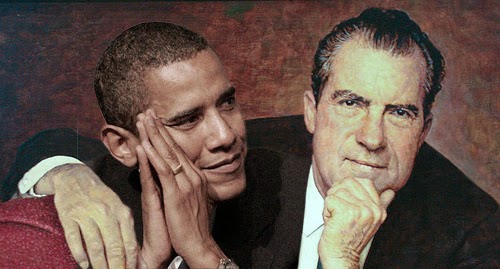In his previous four State of the Union speeches, it popped up 132 times, topping out at 42 instances in 2011 and 34 last year. And that doesn't even rank Obama at the top of the presidential heap over the last six decades. President Clinton was the champion of "new" with 275 usages, including 53 in his 1998 address. Dwight Eisenhower was next with 171 citations, then Obama, followed by Nixon with 119 and George W. Bush with 101. At the bottom is Carter with only 36 "news" in his three speeches. Surprisingly, it was a two-term president, Ronald Reagan, who shunned almost all things "new" in his speeches. Reagan said the word only 42 times in seven addresses.Sadly much of the time when a POTUS uses the term 'new" it really means repacking of the same old crap.
Except for Reagan, all of the last 11 presidents have tried to use their annual trip to Capitol Hill to appear activist, engaged, and forward-looking—all things that speechwriters try to capture with the word "new." Combine that with presidential envy of Woodrow Wilson's New Freedom, Franklin D. Roosevelt's New Deal, and John F. Kennedy's New Frontier, and you've got dozens of failed attempts to sell fresh and snappy terms.
Expect to hear this president use his speech this year to push Congress to make 2014 "a year of action." It's a phrase he previewed earlier this month. But there is nothing new here. It is borrowed. Credit Nixon for this one. In his State of the Union in 1972, he complained that Congress had ignored his legislative agenda over the past 12 months. That, he said, had been "a year of consideration." But, he added, "Now, let us join in making 1972 a year of action on them, action by the Congress, for the nation, and for the people of America."
Presidents are "always looking for a simple, easy-to-remember message on top of all their policy proposals," said William Galston, Clinton's chief domestic policy adviser. "Something that not only gives some rhetorical lift but gives the people listening to the speech the impression that it all ties together, that all these specific ideas are in pursuit of a common goal or a common vision." Galston added, "Underlying that is the message of leadership—'Hey, I know what I am doing. I am here for a purpose. I'm a clear-eyed, goal-oriented, mission-oriented leader.' And a good slogan can convey all of that."That "new" is as new as the detergent with new packaging that cleans the same as the "old", or the sugared cereal which calls itself new, but the only thing different about it is the word New on the box.
That has given us Clinton's New Covenant, Nixon's New Federalism, and Carter's New Foundation, all terms unveiled in a State of the Union address. Carter's was perhaps the most unfortunate in 1979. He used the term five times and the word "foundation" 13 times. But only three days later—after much mocking that a "new foundation" had something to do with women's undergarments—Carter cast the campaign aside, telling reporters, "I doubt it will survive. We are not trying to establish this as a permanent slogan. It was the theme that was established ... for one State of the Union speech." Forget that the White House had, indeed, been selling it as a permanent slogan.
He will still attack the tea party and or the GOP. He will blame congress for his lack of success, he will say he has a plan for this and/or that but never provide details, and of course he will threaten to use the executive action he doesn't legally have the authority to use.
George E. Condon Jr. is correct we will hear the world "new" plenty of times tomorrow, but if the past five SOTU addresses are any indication, not one of those "news" will be anything but a repackaged old.

No comments:
Post a Comment